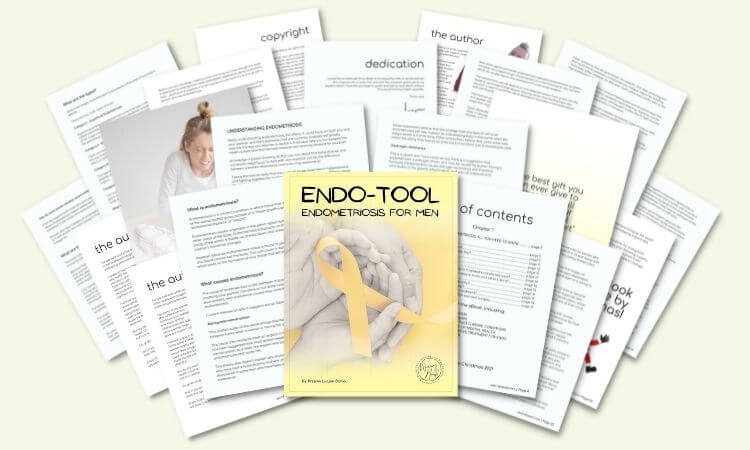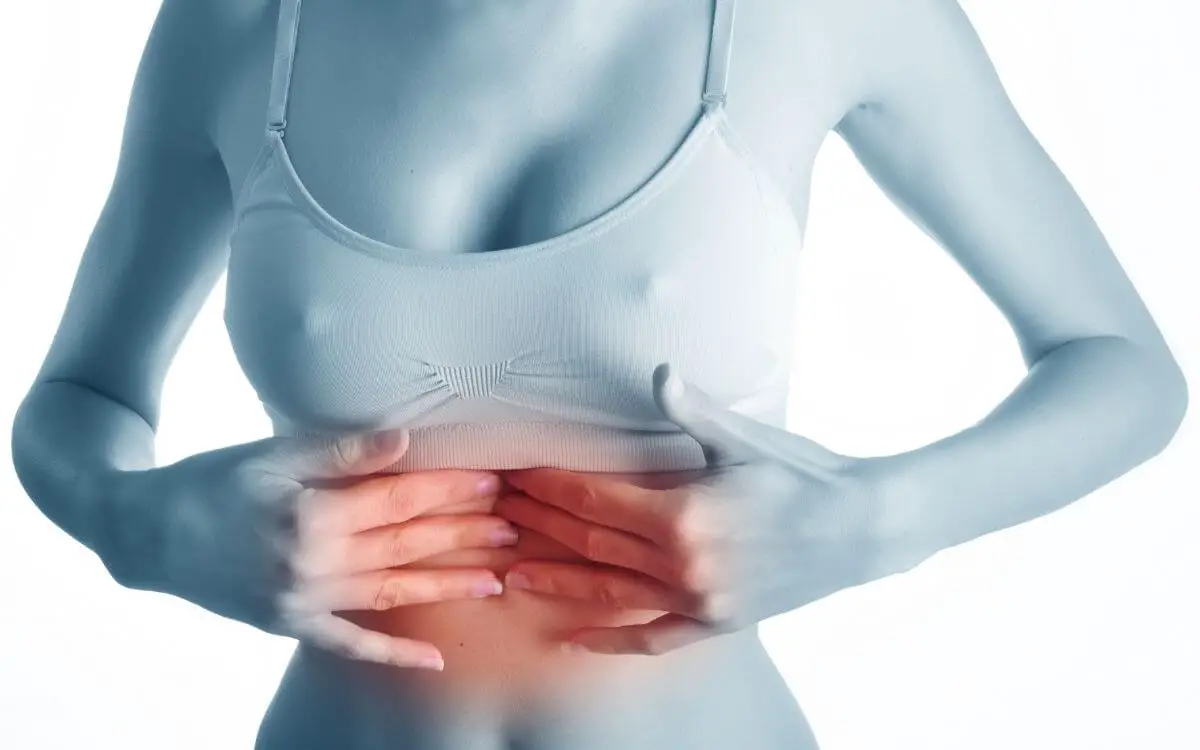What endo-belly is?
What is the endo-belly? In short, endo belly is abdominal distension caused by endometriosis.
Abdominal distension is a medical condition characterized by abdominal pain and bloating. The abdominal pain is caused by inflammation which results in the buildup of fluid and gas in the abdominal cavity, which leads to pain and bloating.
In order to understand what endo belly is, you need to know what endometriosis is. I explain this in the following paragraph.
What is endometriosis?
Endometriosis is a chronic condition where the tissue similar to the one that lines the inside of the uterus (the endometrium) grows outside of it which results in inflammation, and can cause abdominal pain, bloating, and constipation.
Endometriosis causes pain and swelling because the tissue builds up and bleeds in an area where it can’t easily get out of your body. Each month, this misplaced tissue responds to the hormonal changes of the menstrual cycle by building up and breaking down just like the endometrium does, resulting in small bleeding inside of the pelvis.
This leads to inflammation, swelling, and scarring of the normal tissue surrounding the endometriosis implants. It can feel like contractions, or “tightenings” with intense pain, coming and going every few minutes. Endometriosis also causes sporadic pains. Sometimes these pains last for days, other times, they take my breath away.
Endometriosis isn’t curable, but there are treatments available to help lessen the symptoms. If you think you might have endometriosis, talk to your doctor about what options are available to you.
If you want to learn everything in terms of endometriosis, I give away a FREE Chapter of my “Endo-Tool: Endometriosis for Men” eBook. This chapter alone includes all the comprehensive medical knowledge, such as:
- What is endometriosis?
- What are the symptoms?
- What causes endometriosis?
- What does endometriosis look like?
- What are the stages?
- What are the types?
- What is adenomyosis and how is it related to endometriosis?
- Why do some women develop severe endo and others don’t?
- Does endometriosis cause infertility?
- How is endometriosis diagnosed?
- Do types and stages affect the treatment?
- Recurrence of endometriosis after excision surgery.
FREE Chapter of “Endo-Tool”!
an Endometriosis for Men book

How do I know if I have an endo belly?
To find out if you have an endo-belly, it is important to know the difference between abdominal distension and irritable bowel syndrome (IBS).
Abdominal distension describes a condition where the stomach protrudes more than 2 cm beyond the navel. IBS, on the other hand, is a disorder of the gastrointestinal tract that results in abdominal pain, bloating, and diarrhea or constipation.
What I tend to notice with my wife, is when she experiences IBS her whole tummy blows, however, if she experiences endo-belly, the swelling seems to be below the belly button.
Is endo-belly a sign of endometriosis?
Endo-belly can be a sign of endometriosis, but not necessarily. abdominal distension, which is the medical term for a bloated stomach, can be caused by a variety of things including endometriosis, irritable bowel syndrome, food intolerances, and other abdominal disorders.
However, taking into account that endometriosis causes endo-belly in some women, abdominal distension can be one symptom of endometriosis. abdominal pain, cramping, bloating, and gas are common, therefore:
- Endo-belly can also cause constipation or diarrhea. This is because the endometriosis tissue can block the fallopian tubes or bowels. This can cause pain and cramping during bowel movements.
- Endo-belly can also be a sign of endometriosis in the abdominal cavity. This is because the endometriosis tissue grows on the outside of the uterus, but it can also grow on the inside of the abdominal cavity. This can cause inflammation and pain in the abdominal cavity.
- Endo-belly can also be a sign of endometriosis in the rectum. This is because the endometriosis tissue can grow on the outside of the rectum, but it can also grow on the inside of the rectum. This can cause inflammation and pain in the rectum.
- Endo-belly can also be a sign of endometriosis in the bladder. This is because the endometriosis tissue can grow on the outside of the bladder, but it can also grow on the inside of the bladder. This can cause inflammation and pain in the bladder.
- Endo-belly can also be a sign of endometriosis in the ovaries. This is because the endometriosis tissue can grow on the outside of the ovaries, but it can also grow on the inside of the ovaries. This can cause inflammation and pain in the ovaries.
- Endo-belly can also be a sign of endometriosis in the pelvic area. This is because the endometriosis tissue can grow on the outside of the pelvic area, but it can also grow on the inside of the pelvic area. This can cause inflammation and pain in the pelvic area.
- Endo-belly can also be a sign of endometriosis in the intestines. This is because the endometriosis tissue can grow on the outside of the intestines, but it can also grow on the inside of the intestines. This can cause inflammation and pain in the intestines.
- Endo-belly can also be a sign of endometriosis in the stomach. This is because the endometriosis tissue can grow on the outside of the stomach, but it can also grow on the inside of the stomach. This can cause inflammation and pain in the stomach.

Is endo-belly soft?
Endo-belly is tender and squishy. Some people say that the endo-belly is hard as a rock, others find that their endo-belly is more like a jellyfish. For my wife, it is definitely hard. The inflammation makes it feel hot to the touch.
Inflammation with endometriosis can cause abdominal bloating, and because of that, the endo-belly is not soft, it feels full and hard, just like a basketball. Because the endometriosis tissue produces chemicals that can irritate the bowel, the irritation causes inflammation, which leads to abdominal pain and bloating.
Endo-belly and IBS.
Endo-belly is different from abdominal distension caused by irritable bowel syndrome (IBS) because it is specifically caused by endometriosis.
Describing endo belly as abdominal distension caused by endometriosis is like saying that a headache is a pain in the head caused by a brain tumor. It’s technically true, but it doesn’t give the whole picture.
IBS is abdominal distension with endometriosis. It is often hard to distinguish between abdominal distension and IBS. However, there are some key differences. abdominal distension is characterized by bloating, abdominal pain, and gas.
IBS, on the other hand, is characterized by abdominal pain and cramping, diarrhea, and constipation. abdominal distension is caused by inflammation of the lining of the abdominal cavity, whereas IBS is caused by the inflammation of the digestive tract.
What is the cause of endo belly?
There are several theories as to why endo-belly occurs…
- One theory is that endometriosis implants trigger an inflammatory response in the abdominal cavity.
- Another theory is that endometriosis implants release chemicals that increase abdominal inflammation.
Inflammation is the body’s natural response to injury or infection. The symptoms of inflammation include pain, swelling, redness, and heat. When endometriosis implants cause inflammation in the abdominal cavity, it can lead to abdominal distension and pain.
Whatever the cause, abdominal distension can be extremely painful and disruptive.
If you think you may be suffering from abdominal distension, it is important to see a doctor. They will be able to rule out other potential causes of your symptoms and develop a treatment plan that is right for you.
5 questions to ask your doctor about endo belly should be:
- What are the possible causes of my abdominal distension?
- What are the best ways to treat abdominal distension?
- What are the risks associated with abdominal distension?
- What are the long-term effects of abdominal distension?
- Can abdominal distension lead to other health problems?
Is it possible to have both?
It is possible for a woman to have both endo-belly and IBS. This is because endometriosis can cause inflammation in the intestines, which can lead to IBS symptoms.
Endo-belly is also different from IBS because the abdominal pain caused by endo-belly is usually cyclical, meaning it gets worse around the time of a woman’s period. This is due to the fact that the endometrium sheds during menstruation, and when this happens outside of the uterus, it can cause inflammation.
FREE Chapter of “Endo-Tool”!
an Endometriosis for Men book

What helps endo-belly?
There are several things you can do to help ease abdominal distension. First, it is important to eat a healthy diet rich in fiber. This will help to soften stools and make them easier to pass.
Additionally, you should avoid foods that trigger abdominal pain or bloating, such as dairy, caffeine, and alcohol.
Finally, you should make sure to get regular exercise. This will help to improve abdominal pain and bloating by helping to move gas and stool through the digestive tract more quickly.
There are a few things that can help ease endo-belly symptoms:
- Taking over-the-counter pain medication such as ibuprofen or acetaminophen
- Applying heat to the abdomen
- Wearing loose, comfortable clothing
- Exercising regularly
- Managing stress
If you think you may have endo-belly, it is important to see a doctor so that they can rule out other potential causes of abdominal distension. They may also be able to recommend treatment options to help ease your symptoms.
Let’s summerise what endo-belly is:
Endo-belly is a condition that is characterized by abdominal pain, bloating and gas. It is caused by the inflammation of the lining of the abdomen. This can be due to a number of factors, including endometriosis, irritable bowel syndrome (IBS), and celiac disease.


About Me
Hi, I’m Lucjan! The reason why I decided to create this blog was my beautiful wife, who experienced a lot of pain in life, but also the lack of information about endometriosis and fibromyalgia for men…
